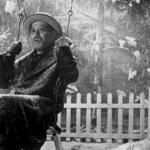Review of Epic, Directed by Chris Wedge
From Chris Wedge, director of Ice Age, comes Epic, a passable animated feature based on William Joyce’s The Leaf-Men and the Brave Good Bugs. The plot is … well, kind of complex and hard to summarize. If you don’t care about the plot and just want the review, you can skip this next bit. If you want the rundown, well, buckle up, because it’s a doozy.
***
Life is hard for teenager Mary Catherine (that’s ‘M.K.’ to you). Following her mother’s death, she finds herself on the doorstep of Professor Bomba, the father she hasn’t seen in years. And why this long separation? Well, it turns out Professor Bomba is obsessed with the idea that the woods around his rather deserted home are infested with tiny people who run around all day doing tiny things in their tiny way. He’s got a whole system of homemade equipment in place to monitor their every move. Not that he’s ever actually seen one, mind you. But minor details like that do not discourage Professor Bomba. He is certain. M.K. is … less than convinced. Their three-legged pug Ozzie does not take sides.
Meanwhile, off in the forest, an entire civilization of tiny people run around all day doing tiny things in their tiny way. For the evil Boggans, this means doing their darnedest to spread death and decay wherever they can. For the … other people (who seem to lack a unifying moniker), daily life involves trying to enjoy life and ward off the efforts of the Boggans. The military unit known as the Leaf-Men are very instrumental in this conflict, but it is the power of Queen Tara that really keeps the darkness at bay. Until, that is, the Boggans get the jump on the Queen on the big day when she must choose her successor. If the Boggans can keep the Leaf-Men from getting the successor … pod … thing to the … place, then evil wins! (Just go with it.)
Fortunately, Queen Tara’s last act before her untimely demise was to shrink M.K. down to Leaf-Man size so she can help with the job. Not that it’s all up to M.K.—she is blessed with the assistance of a snail with noble aspirations, a slug with romantic intentions, a loyal captain of the guard, and, well, an obnoxious, irresponsible deserter. Obviously, they cannot fail, though the Boggan leader certainly seems to think otherwise. Shenanigans ensue.
***
The movie was … fine, I guess. Younger viewers will likely be entertained, though there was a noticeable lack of laughter in the screening I attended, despite the youthful demographic. The plot isn’t the most innovative—a blend of Ferngully, Honey, I Shrunk the Kids, and the singing flowers from Alice in Wonderland. The visuals are striking, and the production design is fairly creative. For the most part, I enjoyed the voice work. M.K. (Amanda Seyfried) is appropriately wide-eyed and spunky, Captain Ronin (Colin Farrell) is all brusque and Irish, and Beyonce made a surprisingly effective Queen Tara. Christoph Waltz, on the other hand, may make a great live-action villain, but his voice is pitched a little high to be believable as the scheming head Boggan Mandrake. Apparently Professor Bomba, who sounded an awful lot like Patton Oswalt to me, was actually voiced by Jason Sudeikis. But then I also got a Mark Driscoll vibe from Nim Galuu (Steven Tyler), so what do I know? Teen heartthrob Josh Hutcherson did a decent job as brash young Nod, but his character was so annoying that I had a hard time appreciating the voice work (sorry, Josh—Peeta 4eva!). And comic relief Mub (Aziz Ansari) and Grub (Chris O’Dowd) were consistently the funniest part of the film. Even then, the movie was really just adequate.
But enough about the cinematic merit of the movie. On to the substance! Obviously, there’s a heavy environmental focus—the lead characters are on a quest to save nature, after all. But I was struck most by the emphasis on community.
In a post Occupy Wall Street world, we’re used to hearing about the 99%, used to hearing about how those rich jerks owe it to us poor schlubs of the world to help us out and spread the wealth. We hear community touted right and left, but it is a community of entitlement. Community means I deserve. I am owed. I am entitled … to a house or a car or a bigger chunk of my neighbor’s paycheck. I have rights, and heaven help anyone who tries to take them away or infringe on them in any way. Community, in America, seems to be about what we can get.
Not so in … Leafy-town or wherever it is that the story takes place. Here, the mantra is ‘Many leaves, one tree.’ As Captain Ronin explains it, this kind of community is one of service. America, with its ‘take take take’ attitude, has the community stick by the entitlement end. Ronin and his fellow Leaf-Men, by seeking to serve others, have figured out what we are still struggling to understand.
And we’re not alone. This concept is a struggle for ‘leading’ ‘man’ Nod, who is more than willing to go it alone when following orders and helping out the team gets too onerous. So he quits—on the Queen’s big day. When everything hinges on her safety, he, one of the men responsible for her protection, decides he has better things to do. Of course, as the story unfolds, he begins to learn something of this community. Very, very slowly. He never seems to really get it. But Ronin does. For him, belonging to a community means serving. He sacrifices time and time again for his people, not because of what they can or will do for him, but because that’s what community really means.
This concept should resonate with us as Christians. After all, our community—the church—is connected and characterized by sacrifice. Despite our diversity, we are bound together by Christ’s atoning death in our place. His sacrifice, His willingness to serve us, is what connects us to one another. So too should our interactions be characterized by a similar sacrificial love. The Bible is replete with admonishments to serve one another in love. As Christ humbled Himself by taking on human flesh, by walking among us, by washing His disciples’ feet, and by paying the penalty for our sins, we are to humble ourselves in loving service of one another. Instead of asking what we are owed, what our community membership entitles us to, we ask: how can we serve others, as Christ has served us?
Not that we do it. All too often, we’re like Nod, opting for our own Lone Ranger independence, free from obligation, free to indulge our own desires. But we should at least acknowledge the picture of community-as-service seen in Scripture. And on good days, that’s what we should be aiming for. (And praise the Lord that for all those times when we don’t aim for loving service, He still lovingly serves us and saves us.)
_______________________________________________________________
Alexis Neal is an attorney in the Washington, D.C., area. She regularly reviews young adult literature at www.childrensbooksandreviews.com and everything else at quantum-meruit.blogspot.com.












